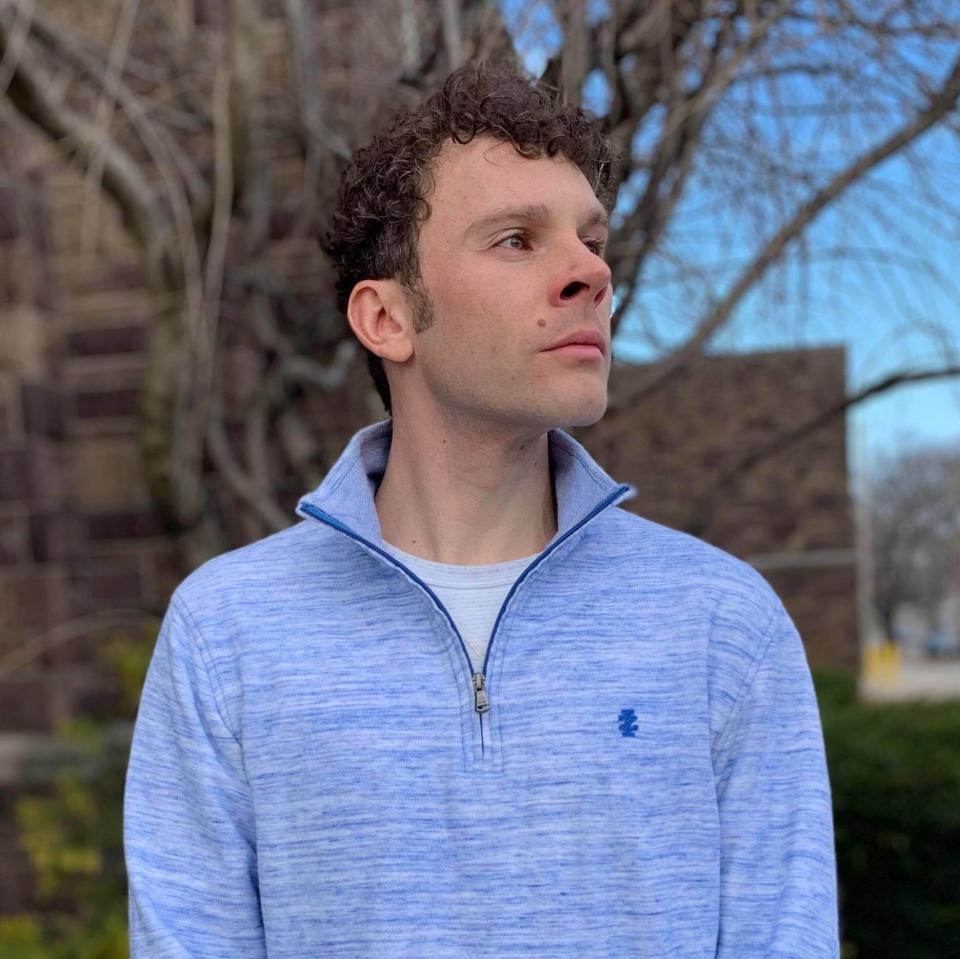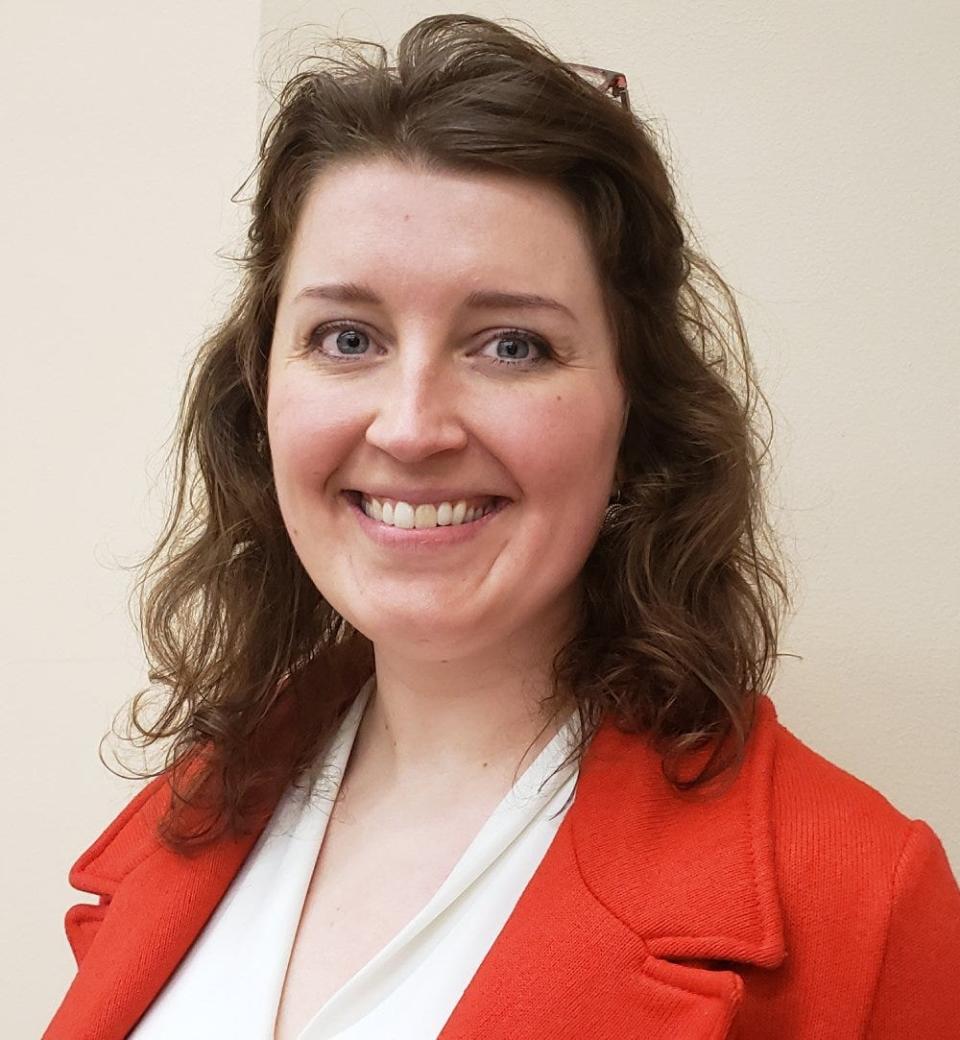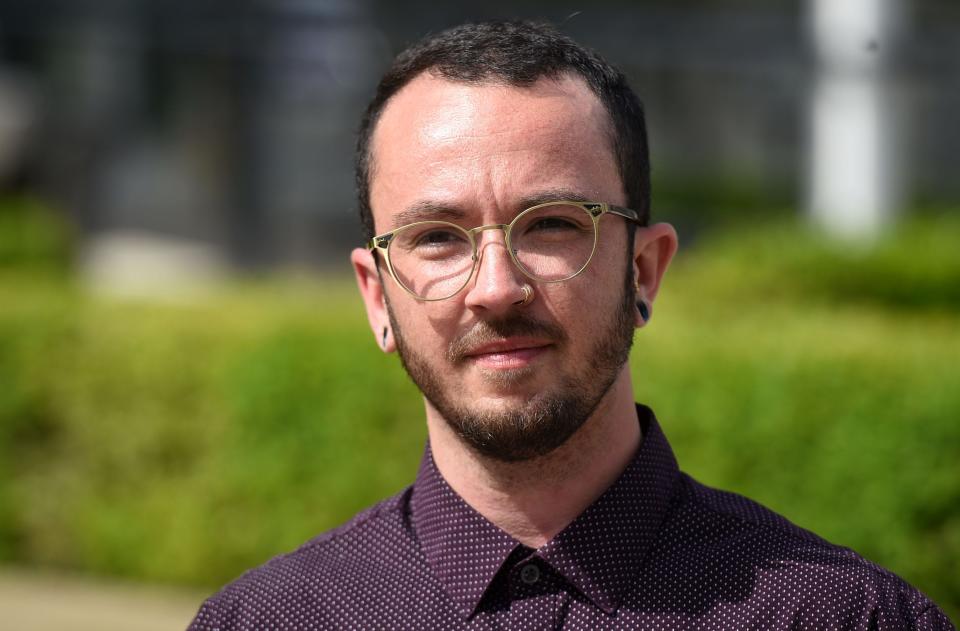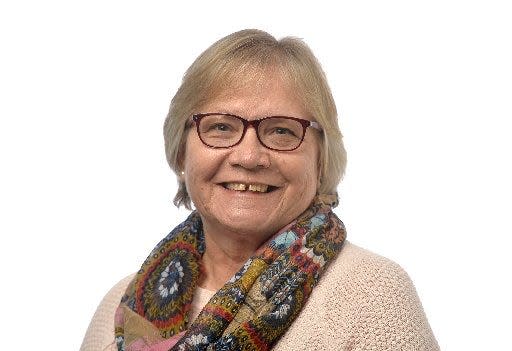The race for Erie City Council: 10 Democrats vying for nominations in May 16 primary
The seven-member Erie City Council will welcome at least one newcomer in 2024.
Two incumbents, Michael Keys and Ed Brzezinski, are seeking another four-year term on the panel.
Newcomer Susannah Faulkner, appointed to City Council in February, has launched her first campaign for public office because she wants to stick around.

Former City Councilwoman Kathy Schaaf is eyeing a return.

And five other Democrats are also seeking their party’s nomination for City Council seats.
Who's running? Here's the list of candidates for Erie City Council, County Council
On the all-Democratic City Council, seats held by Brzezinski, Keys and Councilman Mel Witherspoon are on the May 16 primary ballot for a four-year term.

Witherspoon is barred from running for re-election because of the city’s limit of three consecutive terms.
Besides Brzezinski and Keys, the candidates are sales professional Rock Copeland; Cory DiLoreto, an adjunct college instructor; substitute teacher Elspeth "Kate" Koehle; businessman Robert Mahrt; teacher Armand Rocco Jr.; former City Councilwoman and retired teacher Kathy Schaaf; and Tyler Titus, a therapist, former Erie School director and a one-time Erie County executive candidate.
Titus became the first openly transgender person elected to public office in Pennsylvania when he won an Erie School Board seat in 2017.

No Republican candidates are in the race, which means the top three primary vote-getters are virtually assured of victory in the Nov. 7 municipal election, barring a successful write-in or third-party candidacy.
Additionally, a two-year City Council seat is also on the primary ballot due to the January resignation of Democrat Liz Allen.

Faulkner, who was chosen by City Council on Feb. 9 to serve in Allen’s seat until at least Jan. 1, is a candidate in that race, along with Brzezinski, DiLoreto and Schaaf.

The candidate who wins the November election for the two-year seat vacated by Allen will serve from Jan. 2, 2024, until the term ends Jan. 1, 2026.
No Republicans are on the ballot for the two-year term, which means the primary winner is virtually assured of victory in November, absent a successful write-in or third-party candidacy.
Regarding the incumbents, Brzezinski spent four years on City Council from 1988 to 1992, followed by 12 years on the Erie School Board from 2006 to 2018.
He returned to City Council after being elected in 2019 and is seeking his second consecutive four-year term.
Keys, also elected in 2019, is seeking his second four-year term.
City Council members serve part-time and currently earn $6,000 a year; council’s president gets $7,500 annually.
Council members are also eligible for city-paid health insurance benefits.
Starting in 2024, City Council members will see their first salary increase since 1986. Council approved an ordinance in February that sets the following salaries for City Council members:
$6,000 for members who've served 12 months or less;
$8,000 for members who've served between 12-24 months;
$10,000 for members who've served between 24-36 months;
$12,000 for members who've served 36 months or more; and
council’s president will receive an additional $2,000 annually.
The Erie Times-News asked all 10 City Council candidates the same three questions regarding city government and local politics.
Here is what they had to say.
What is the most important issue facing city government right now, and how specifically would you address it?
Brzezinski said "our biggest problem is the budget. There has never been a better time to bring revenue and expenditures in line.”
While American Rescue Plan funds have helped bring tens of millions of dollars to the city in the wake of the COVID-19 pandemic, “how we spend it could lead to better times or much worse," Brzezinski said. "Longtime homeowners struggle to make their bills now. We aren’t making it any better with multiple hires and fee increases."
Keys mentioned city government's "structural deficit" as his top issue. According to some financial projections, the city could face a budget deficit that exceeds $10 million in the next three to five years.
Keys said he would “institute a hiring freeze on adding new positions, even if the employee’s wages are being paid with (federal American Rescue Plan) money.”
Faulkner pointed to poverty as the city’s most pressing issue, saying that huge percentages of Erie’s youth “are growing up poor.
“We need to empower and uplift families to become homeowners to strengthen our tax base, create more safe and affordable housing options, increase wages for more family sustaining jobs, address our childcare shortage, and expand development incentives for local businesses,” Faulkner said.
Copeland cited “several interconnected issues.
“Erie is going through a revival, but not all residents are experiencing this revival equally,” he said. “Many areas of Erie are experiencing significant growth, but most of these areas have a high density of tax-exempt properties. In other parts of the city, absent landlords allow properties to fall into decay. What wealth we have leaves town on rent checks while assets are in decline.”
He added that ”low rates of home ownership also mean that even when the city enjoys organic tax base growth through private and public investment, our residents are missing out on the opportunity to build generational wealth for their families. Each of these issues is a roadblock to re-investing in our community.”
Titus pointed to the fact that “population within the city continues to decline, access to affording housing remains a barrier for many working families, while we watch rates of violence and poverty trend upwards.
"When on City Council I will focus on expanding access to safe, affordable housing. I will work to improve public safety to ensure safe streets, neighborhoods, and schools,” Titus said. “We can create a thriving local economy by modernizing our city's infrastructure, supporting small businesses, and improving accessibility to downtown and our neighborhoods.
“Bottom line is, in order to have an Erie where our kids stay and new people want to move, we have to put people first,” Titus said.
Schaaf said “a most important issue facing city government is how do we best address the needs of our whole community with limited funds to give out and come in while we attempt to stop the exodus of those leaving to live elsewhere.
“Erie city government needs to address the specific needs of our poverty-stricken people living in the streets, in low income housing and people living on fixed incomes,” Schaaf said. “Our working middle class and seniors on fixed incomes can no longer afford to have tax increases. Many people unfortunately are only a paycheck or two away from evictions and foreclosures.”
Mahrt believes getting people to move back into the city limits is a key issue for city government.
He said that if elected, “my primary goal would be to do anything in my power that will incentivize more people to move back into the city and more businesses to grow and relocate within the city. The city budget will continue to be under great pressure in the coming years, the only way to counteract this is by growing the number of taxpayers in Erie ― solving this will make all other needs and wants of city government more easily obtainable for all citizens of Erie.”
Rocco cited several issues, including poverty, crime, taxes and blight.
“Our problems run much deeper and a surface refinishing won’t address the roots of our issues,” Rocco said. “To me, the most important issue we can address is the question I keep asking my friends, neighbors, colleagues and our elected officials: Why does Erie, Pennsylvania, maintain such a high degree of unfulfilled potential?”
If elected, Rocco said he would “make it my priority to find those whose visions will leverage Erie back into a city of 100,000 people-plus, and fulfill the vast ocean ― not-just-lake sized ― potential (that) Erie possesses.”
Koehle said youth violence is the most significant issue affecting Erie right now.
“By addressing the root causes of violence, such as rampant poverty, I believe we can begin to reduce violent crime,” Koehle said. “The city has set aside $2.1 million dollars for a youth investment fund which can be used to leverage grant money to combat poverty.”
DiLoreto said "the most important issue in city government is and always will be open and honest communication and transparency. ... When there is a lack of open and honest communication and transparency, the precedentand foundation is laid for uninformed, myopic decisions wherefrom less than desirable results are achieved."
"Citizens want tangible results and they want to be included in the conversation," DiLoreto said, adding that if elected," I would address this issue by suggesting with great emphasis the implementation of neighborhood coalitions as a means to providing an outlet to everyone to express their voice, while simultaneously improving ourneighborhoods."
What unique qualities would you bring to City Council?
Brzezinski mentioned his “years of experience, that I gladly share with council. I also enjoy conversations across age lines with our younger members.”
He added that the current council is a “good group” he believes is “agenda free” and focused on “making Erie the best it can be.”
Keys said he has an ability to look at an issue from both sides and “analyze it from different perspectives.
"My degree is in humanities,” Keys said, “so I look at all legislation under the lens of how it will affect the people of the city of Erie, especially through the eyes of the least fortunate.”
Faulkner said she has a “strong work history in policymaking” that includes initiatives both abroad and in other parts of the U.S.
Faulkner earned a master’s degree from the London School of Economics and has worked as a public affairs consultant in California, helping to develop and advocate for mental health and anti-poverty policies/programs for youth.
She said that experience gives her a “global perspective on possible solutions to Erie’s top issues like economic development, environmental protections, food insecurity, aging infrastructure, blight and chronic poverty.”
Copeland said he has worked to get other local Democrats elected in the past and that he simply wants to “serve our community.
“I believe that this emphasis on servant leadership sets me apart from many candidates,” Copeland said. “Now that I am a candidate myself, I seek to lift up the voices of all the people of Erie.”
Titus, who uses the pronouns they/them/their, said they have worked with various elected officials and other leaders locally and throughout the state during their time on the Erie School Board, as well as through their work as a therapist and as a member of former Gov. Tom Wolf’s Pennsylvania Commission on LGBTQ Affairs.
"For the past decade I have been on the front line to create change, to build real solutions for our community,” Titus said. “As a small business owner, a parent, someone who has held elected office ― I understand what it will take to build a better Erie.”
Schaaf, a longtime teacher who described herself as “semi-retired,” said she is now in a position to “attend more community meetings, research issues, inspect sites in person as I will no longer have a pressing job If elected.
"I have experience from being on City Council in the past, particularly in dealing with the pandemic” Schaaf added. “I will be that person better able to respond and get back to you. I listen. I am present in the moment.”
Mahrt said he has helped create small businesses and that he has “extensive experience in government finance and economic matters, previously managing U.S. Air Force and U.S. Navy project budgets in excess of $200 million annually ― similar in size to the City of Erie budget.
“If elected I would be the only member of council with this type of financial management experience and unique perspectives of how to help grow and attract small businesses back to the city,” Mahrt said.
Rocco said what sets him apart as a candidate is “my accessibility, my open-mindedness and my firm belief that doing things the way we’ve always done them will only bring more of what we already know.”
Rocco added that while traveling to other cities recently, and seeing the progress they have made, “it got me to wondering just how often our own city leaders communicate with leaders in other cities, or visit small towns and larger urban areas for ideas,” Rocco said. “And it shakes me to my core when I see or hear a person respond to a challenging, seemingly futile situation by simply shrugging and saying, 'What can we do? We’ve always done it this way.' That can’t be the mindset of Erie’s leaders, and it won’t be the mindset I bring as a member of council.”
Koehle said her experience as an organizer for both labor unions and social justice organizations, as well as her “lived experience as a renter and someone who has had to rely on public assistance in the past,” make her a different kind of candidate, and “give me the unique empathy needed to serve our residents.”
DiLoreto said his unique qualities include previous work as a legislative assistant for State Rep. Ryan Bizzarro of Millcreek Township, D-3rd Dist., and in the City Treasurer's Office.
He added that as an avid cyclist, he would be "a strong proponent of mobility infrastructure and beautification projects" which contribute to the city's "mental and physical health, the interconnectivity of neighborhoods, citizen mobility and alternative transportation options, and a reduction in crime."
Describe in detail how you would go about securing majority support for an ordinance or resolution to get the measure passed?
Brzezinski gave a simple answer.
“You speak the truth, ask for alternative ideas and work together for the best results,” he said.
Keys said a member of council must “introduce good legislation that will have a positive impact for the city and its residents. I (would) rely on the intelligence and good judgment of my colleagues to build a consensus.”
Faulkner said that in her short time as a City Council appointee, “I have already demonstrated positive conflict resolution and negotiation skills. I am currently working on initiatives to better protect renters and to improve coordination between the city, county, police departments, and service providers for crisis mental health services.
“I do my research, talk with all stakeholders, meet with fellow council members and City Hall staff, and, most importantly, receive feedback from impacted members of the community,” Faulkner said. “The only way to solve decades-old problems is to work together.”
Copeland said that as a salesman, “I seek to understand the needs and motivations of my customers.”
He would take a similar approach as a member of City Council when it comes to forging majority support for an issue.
“Being open to understanding the concerns of your peers not only makes you a good colleague, but an effective legislator as well,” he said. “Many candidates have grand plans and hopes of implementing them unilaterally.
"But decisions are not made in a vacuum. It’s necessary to communicate effectively and build relationships with your peers. Pragmatic decision-making, advocacy, and compromise are at the heart of what enables our government to function.”
Titus said: “When we place people at the center of the discussion and ensure we are focused on how the ordinance, resolution, policy, (or) budget item will impact those we were elected to serve and represent, we can keep the work moving.
“I will work with the same diligence as I did in the other roles that I have held,” Titus said. “I meet with the public, I meet with my colleagues, and we work until we figure it out. That is what we are elected and appointed to do, anything less is not acceptable.”
Schaaf said she would meet with colleagues in a group setting, online or in person, “where there are no more
than three, or reach out individually to hear the positive and negatives of (an) idea or presentation.
“You get your feedback as to whether or not you will have enough votes to carry it through to completion,” Schaaf said. “Community involvement is always good to persuade your colleagues as well. You share your writings/research with the solicitor's office to be put on the agenda using the help of the city clerk's office. ... It is important to go through steps and not just force something that no one has been briefed on.”
Mahrt said it is critical as a decision maker to be able to “hold two opposing ideas in your mind at the same time, to be able to balance the pros and cons of each, discuss these points openly, and then finally decide what is the best potential path forward for all groups involved.
Compromise ― finding a middle ground ― will always be my goal when entering into any major issues,” Mahrt said. “I believe by setting this as a goal up front, and being respectful and honest ― over time will make finding majority support on issues much more likely.”
Rocco said that securing majority support for an ordinance or resolution he supports/proposes “will require whatever is necessary within the rules and boundaries of the body, and I am prepared to go to any lengths necessary when I believe my position is in the best interests of the city.
“I believe my open-mindedness is enough of a strength that, when I ultimately make a decision, that decision has been thoroughly and completely vetted from all perspectives,” Rocco said. “Because I will have vetted that decision from every angle, I know that I will then be prepared better than most to argue the value of that decision to any dissenter. I’m a teacher. I will educate. And what better way to persuade than by presenting the truth of data, evidence, preparation, and logic, all of which I will work hard to arm myself with.”
Koehle promised that “any ordinance I am passionate about I would also be very informed on. I would garner support by illustrating the logic and urgency of any resolution or ordinance I wished to pass to my colleagues.
“I would do this by having conversations, study sessions if necessary, and by providing data and neighborhood concerns, or any other research available,” Koehle said.
DiLoreto said: "When we talk about obtaining support from colleagues, we're talking about individual and collective goals and values, and what one individual values more than another. In this sense, naturally there will be a give and take methodology surrounding decision making."
In trying to secure majority support for an issue, DiLoreto said he would collect data and input from citizens and consider "a variety of possible solutions and the consequences of each," when talking with colleagues.
The candidates
Ed Brzezinski, Democrat (Incumbent)
Age: 76
Family: Married, five children, 12 grandchildren
Occupation: Retired educator with the Erie School District; former real estate broker and residential appraiser; served on Erie City Council, 1988-1992, and on the Erie School Board, 2006-2018.
Education: Bachelor's degree in English, minor in education, and master's degree in counseling, Gannon University; certificate in secondary administration, Edinboro University of Pennsylvania.
Running because: "I want to continue to be the voice of the people."
Michael Keys, Democrat (Incumbent)
Age: 56
Occupation: Security professional at Westinghouse Air Brake Technology (Wabtec)
Education: Bachelor's degree humanities/criminal justice, Gannon University
Family: Married, 5 stepdaughters
Running because: "I am running for re-election to ensure that the initiatives that we have undertaken over the past four years get completed. Most notable are the EMI Building project and the Rodger Young Park."
Susannah Faulkner, Democrat (appointee)
Age: 34
Occupation: City Council Member; director of development at the Sisters of St. Joseph Neighborhood Network; youth dance instructor for the Erie Dance Theater and the Martin Luther King Center.
Education: Bachelor of Arts degree in politics from Ithaca College; Masters degree in public and social policy from the London School of Economics
Family: In a relationship
Running because: "Erie's youth and families deserve a future they can believe in."
Rock Copeland, Democrat
Age: 39
Occupation: Electrical product sales professional
Education: High school graduate; studied for three years at Purdue University
Family: Divorced, 2 children
Running because: "I’m optimistic about the future of Erie and I want to advocate for its success."
Tyler Titus, Democrat
Age: 38
Occupation: Licensed clinical therapist; owner of Refuge Therapeutic Services
Education: Doctorate in social work
Family: Married, 2 children
Running because: "To build an Erie where our children want to stay and new people want to move."
Kathy Schaaf (Democrat)
Age: 61
Occupation: Retired teacher; former member of Erie City Council
Education: Saint Benedict Academy and Villa Maria College graduate; post-college classes to attain various teaching certifications.
Family: Married, 2 daughters and 3 grandchildren.
Running because: "I don't want to live with the 'what ifs' in life."
Rob Mahrt, Democrat
Age: 37
Occupation: Local small business owner; financial controller for a federal government consulting firm
Education: Bachelor’s degree in business economics from Ohio University; graduate certificate in applied intelligence from Mercyhurst University
Family: Married, one dog and two cats
Running because: "My unique small business and finance background and experience will provide critical skills and knowledge that is currently absent from Erie City Council."
Armand Rocco Jr., Democrat
Age: 52
Occupation: Teacher
Education: Graduate of Strong Vincent High School and Mercyhurst College. Master’s study through a variety of institutions including The University of Pennsylvania
Family: Separated, 2 children and one stepdaughter
Running because: "I realized one day that I have received so much in my life from this city that it’s time for me to give back so that I can leave to my children and grandchildren and even better Erie than the one I’ve known for the past 50 years."
Elspeth "Kate" Koehle, Democrat
Age: 46
Occupation: Substitute teacher
Education: Bachelor's degree in philosophy and religion, Edinboro University
Family: Married, 4 sons
Running because: "I am tired of asking the city for progressive policy; it’s time to have a seat at the table."
Cory DiLoreto, Democrat
Age: 36
Occupation: Adjunct professor, Gannon University
Education: Bachelor's degree in business administration/marketing, Mercyhurst University; Masters degree in business administration from Gannon University
Family: Single
Running because: "To bring more open and honest communication andtransparency to city government and to include those who want to be included. To deliver tangible results by following through with and implementing past and current city plans."
Contact Kevin Flowers at kflowers@timesnews.com. Follow him on Twitter at @ETNflowers.
This article originally appeared on Erie Times-News: Erie City Council: 10 Democrats seeking nominations in May 16 primary

